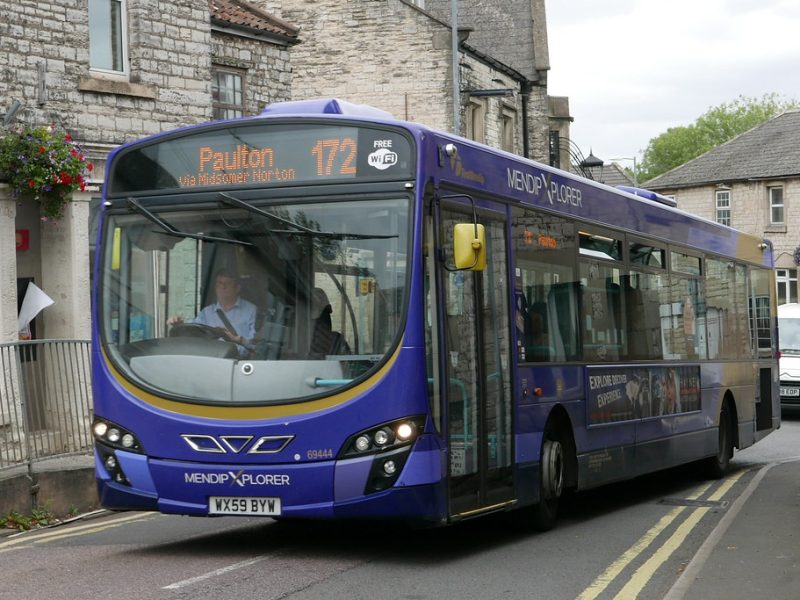By Local Democracy Reporter Alex Seabrook: Bus passengers in the West of England face further cuts to the region’s struggling public transport network as about 42 bus services face the axe. Due to a funding row, from April these publicly subsidised services will no longer be funded and most likely withdrawn.
Also from April, passengers in many parts of the region will be able to catch new ‘demand responsive transport’ minibus services. The new dial-a-ride West Link minibus services will act almost like a shared Uber, running in Windmill Hill, Knowle, Brislington and St Annes, as well as large parts of North East Somerset and South Gloucestershire.
The service cuts were signed off by the West of England combined authority on Wednesday, January 18, after the region’s political leaders heard how many of the services were crucial in connecting isolated communities and persuading drivers to use public transport instead.
The axed bus routes form a huge 60% chunk of the region’s total 69 subsidised services. However it’s unclear exactly which bus routes are facing the axe in April, and a full and accurate list was not provided in reports to the combined authority meeting.
During the meeting, West of England metro mayor Dan Norris blamed the three council leaders — in Bristol, South Gloucestershire and Bath and North East Somerset — for paying the combined authority too small a transport levy. Mr Norris said this year’s increase to the transport levy was less than inflation, so service cuts had to be made.
Mr Norris said: “It’s their [the three councils’] money effectively and they’re saying how it should be spent. That’s not satisfactory from my perspective. We have a real term cut in supported bus services because the levy has not increased. The levy is much lower than in other parts of the country.
“In future I would like to have precepting powers. I’ve basically been given lists by the unitary authorities of what bus services they’re going to support. With inflation and the same budget being frozen, that inevitably leads to cuts. That’s not acceptable to me but that’s where we are.
“At the moment we have about £20 a head per year for our transport levy, and that compares to the ones at the top of the combined authorities in other parts of the country, that are £60 a head. There are huge reserves in some of our council areas that could perhaps be used in a way that deals with exactly these concerns, and that’s a political choice.”
The metro mayor also repeatedly denied that the new West Link minibus services were replacing the subsidised services — despite West Link kicking in at the same time the 27 existing routes are withdrawn. A quirk in government funding rules means that the West of England has tens of millions to spend on buses, but only in “new and innovative” ways.
Mr Norris added: “This is not a substitute for proper bus services, it’s a way of linking up people in more remote areas. I’ve asked the government if it’s possible to use the money I’ve received to maybe support bus services that are under threat, and it was very clear that the answer from them was ‘no, it has to be spent on ideas that are new and innovative’.”
Bath Liberal Democrat Cllr Winston Duguid, chair of the West of England scrutiny committee, warned against taking a “big bang approach” on April 2 with the new West Link minibus services. He added that the West of England should lobby the government for extra powers and funding, to be able to sort out the region’s struggling bus network in the long term.
He said: “There’s a huge education campaign to be done if this is going to be successful in very limited time. We’re playing with people’s lives here, how they get to work, how they get to school, how they get to hospital appointments. To introduce this without a sufficient transition period is getting near to reckless.”
Bath Green Cllr Joanna Wright said that to make transport work politicians need to think beyond being elected.
It’s currently unclear exactly which services are being cut in April, or even how many. Papers to the combined authority meeting gave a long list of services which could potentially be subsidised, and a shorter list of routes which will continue to receive subsidies. However, the long list also included services which already don’t exist at the moment, let alone after April.
WECA initially sent out a list of bus routes likely to be axed but this may change but at the time of going to press it included the 179 Bath to Midsomer Norton, the 22 Twerton to Bath Uni, 683 Keynsham to Wells and the 172 Bath to Paulton
Bath Voice Bus News: the cuts include 179 Bath to Midsomer Norton, the 22 Twerton to Bath Uni, 683 Keynsham to Wells and the 172 Bath to Paulton

